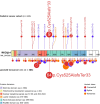Enrichment of heterozygous germline RECQL4 loss-of-function variants in pediatric osteosarcoma
- PMID: 31604778
- PMCID: PMC6824257
- DOI: 10.1101/mcs.a004218
Enrichment of heterozygous germline RECQL4 loss-of-function variants in pediatric osteosarcoma
Abstract
Patients harboring germline pathogenic biallelic variants in genes involved in the recognition and repair of DNA damage are known to have a substantially increased cancer risk. Emerging evidence suggests that individuals harboring heterozygous variants in these same genes may also be at heightened, albeit lesser, risk for cancer. Herein, we sought to determine whether heterozygous variants in RECQL4, the gene encoding an essential DNA helicase that is defective in children with the autosomal recessive cancer-predisposing condition Rothmund-Thomson syndrome (RTS), are associated with increased risk for childhood cancer. To address this question, we interrogated germline sequence data from 4435 pediatric cancer patients at St. Jude Children's Research Hospital and 1127 from the National Cancer Institute Therapeutically Applicable Research to Generate Effective Treatment (TARGET) database and identified 24 (0.43%) who harbored loss-of-function (LOF) RECQL4 variants, including five of 249 (2.0%) with osteosarcoma (OS). These RECQL4 variants were significantly overrepresented in children with OS, the cancer most frequently observed in patients with RTS, as compared to 134,187 noncancer controls in the Genome Aggregation Database (gnomAD v2.1; P = 0.00087, odds ratio [OR] = 7.1, 95% CI, 2.9-17). Nine of the 24 (38%) individuals possessed the same c.1573delT (p.Cys525Alafs) variant located in the highly conserved DNA helicase domain, suggesting that disruption of this domain is central to oncogenesis. Altogether these data expand our understanding of the genetic factors predisposing to childhood cancer and reveal a novel association between heterozygous RECQL4 LOF variants and development of pediatric OS.
Trial registration: ClinicalTrials.gov NCT01354002 NCT02530658 NCT00760656.
Keywords: Hodgkin lymphoma; T-cell acute lymphoblastic leukemias; craniopharyngioma; osteosarcoma; pre-B-cell acute lymphoblastic leukemia.
© 2019 Maciaszek et al.; Published by Cold Spring Harbor Laboratory Press.
Figures




References
-
- Bonache S, Esteban I, Moles-Fernández A, Tenés A, Duran-Lozano L, Montalban G, Bach V, Carrasco E, Gadea N, López-Fernández A, et al. 2018. Multigene panel testing beyond BRCA1/2 in breast/ovarian cancer Spanish families and clinical actionability of findings. J Cancer Res Clin Oncol 144: 2495–2513. 10.1007/s00432-018-2763-9 - DOI - PMC - PubMed
Publication types
MeSH terms
Substances
Associated data
LinkOut - more resources
Full Text Sources
Medical
